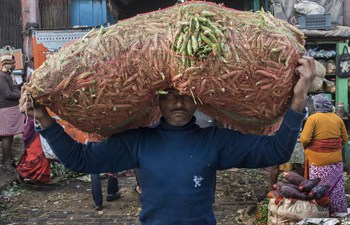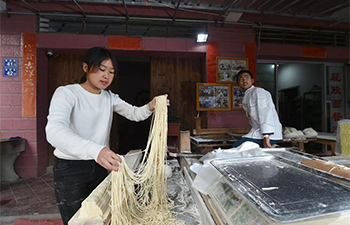SYDNEY, Jan. 5 (Xinhua) -- Australian researchers said on Friday that they have found a novel way to aid the development of a crucial malaria vaccine, by genetically engineering a version of a species behind the major infectious disease.
The approach involved "tricking" the Plasmodium falciparum malaria parasite species into expressing the protein of the Plasmodium vivax one, which infects human red blood cells that lead to the widespread disease, Professor James Beeson, who with Dr Damien Drew led the research team, told Xinhua.
"It's been much harder to progress vaccines for vivax because it's very difficult to work with in the laboratory and to study. And we understand much less about how it works and how we might make a vaccine to target it," said Beeson, who is also deputy director at Australia's Burnet Institute medical research facility.
"What we did was we looked at a point that seemed to be in common between the two types of malaria ... enabling us to really get some new insight into how this infection works."
Through their approach, his team found that antibodies generated by vaccination to the P. vivax protein effectively blocked infection of human red blood cells, pointing to a new vaccine target and development strategy.
The P. vivax and P. falciparum are the deadliest of the five species of malaria that infect humans, accounting for almost all of the estimated 212 million cases globally and 429,000 deaths in 2015, according to latest World Health Organization.
Despite decades of global research and development, no malaria vaccine has been licensed and little progress has been made in developing vaccines for P. vivax malaria, the institute said in a statement on Friday.
The Burnet study, published in the Journal of Infectious Diseases, focused on AMA1, a key protein shared by P. vivax and P. falciparum. While it was well known that the protein plays a key role in helping P. falciparum to infect red blood cells, much about the function and molecular properties of it in P. vivax have been unclear. The research showed the function of the protein in both malaria species to be complementary despite the fact that the two evolved independently and otherwise differ in the proteins they use to infect human red blood cells.
The next step will be to understand the molecular details more and the key points where the proteins interact, so that a vaccine can be designed to efficiently and effectively block the step in which the red blood cells are infected, said Beeson.
"That's the challenge for any vaccine ... you don't want something that is only partially effective because then the infection can sort of slip through and avoid the vaccine," he said.
"We need to find something that effectively blocks that infection point. We want to maximize that as a first step."

















